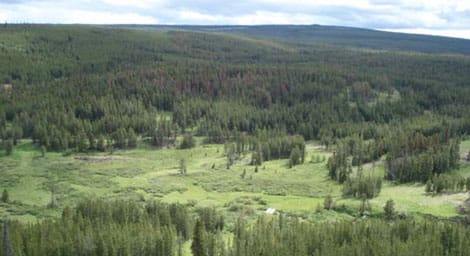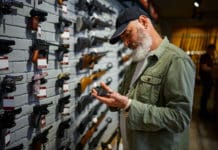“Randy Hawes, [British Columbia’s] minister state for mining, says he’s heard some First Nations members talking about using shotguns and giving their lives to prevent Taseko’s Prosperity Mine project,” ctvbc.ctv.ca reports. “He says he understands the spiritual value of the area to First Nations and knows the aboriginal community has concerns about the project, but no society will tolerate threats of violence. Hawes also says many non-aboriginals in the Williams Lake area desperately want the economic benefits the mine would provide.” This small story raises some big questions. Like the importance of American’s Second Amendment . . .
TTAG has chronicled liberal commentators’ attempt to paint the Tea Party as gun nuts, proto-terrorists and fascists-in-training. To tie them to the Hutaree and/or anyone other group of armed extremists. To portray them as the harbingers of armed insurrection.
Funny that. As the Glenn Beck rally proved, you couldn’t ask for a nicer group of folks. From what I’ve seen, Tea Party people are unflaggingly polite (at least to each other), swear fidelity to the democratic process and keep it clean (litter was obvious by its absence).
Yes BUT—there is a threat of armed insurrection. Oh, it’s a distant threat. A veiled threat. But let’s face it: those Americans who oppose a large, centralized, profligate federal government aren’t entirely unfamiliar or uncomfortable with the idea that they could take up arms against their own government if they really had to.
Let me put that another way: there’s a balance of power out there, somewhere, between the governing and the governed. And it doesn’t depend exclusively on what happens at the ballot box. Mainly. But not exclusively. Privately held guns are the 500-lbs. citizens in the room.
More to the point (at least relative to this Canadian contretemps) private firearms are the ultimate protection from tyranny for besieged minorities. Southern whites certainly thought so; they did everything in their power to remove guns from blacks, both before and after slavery. Florida’s Seminole Indians might have a thing or two to say on that front as well.
As do, now, Canada’s First Nations aboriginals.
The funny peculiar thing about this story is the Minister’s assertion that no society will tolerate threats of violence (rather than violence per se). I maintain that Hawes got it exactly backwards. A free society is based on threats of violence.
Would citizens obey the law if they didn’t face the threat of law enforcement? Would America respect its minorities—and I’m not speaking solely about race or religion—if they didn’t have firearms? I think not. Even the threat of armed resistance changes the political dynamic. As it has here. As it should. An armed society is a free society. Except when it isn’t.





I have to disagree with you on this front. In Canada, there have been many instances of natives/aboriginals threatening others on so called "sacred" of native land. They have actually broken the law many times in these instances but do to political correctness and appeasement, nothing has been done about it. You should look into the "blockade of Caledon". I'm from Ontario, so I'm more familiar with this.
Natives wanted to kick all the non-natives off. They blockade all the roads going in and out of the area around Caledon, Ontario. The OPP did nothing about this even though lives were being threaten and ruined. However, when a non-native started waving a Canadian flag the OPP threw him to the ground and tried to arrest him. They alleged that waving a Canadian flag was "instigation" but threatening families in the middle of the night was totally legit.
Just trying to give you some context.
True, the threat of violence is unthinkable. I find it unappealing and have challenges finding sympathy with it. I live in the middle east. The threat of violence is rare here, at least where I live. However it surrounds us. The threat in Canada by first nations is on no level the same as it is here. This comes from within a peaceful, democratic nation which should instill thought, rather than argument or grand statements.
In a country like Canada, where rights are taken for granted by most, the threat of violence is a rare statement. However, I think that the threat comes from the underlying notion that rights will not be listened to, that the threat of violence is an act of last resort. How was Canada settled? It was taken by force. If you disagree check Canadian history. Force has many methods and faces.
I suspect that the threat here is one of last resort, when no other avenues can be taken. It is an invitation for dialogue when no other methods are working. It should be listened to and reasoned with. If Canada is to rise above our past, we must deal with aboriginal claims and rights or we become what other nations are seeking to escape from, not aspire to.
Justin, Canada in the 21st century is not the British or French colony from the 17th century. Canada wasn't really conquered as most of it was uninhabited. There wasn't much in the way of warring conflict with the natives either. In fact, in many instances (like the War of 1812) they fought along side the British and French.
Not only are rights in Canada taken for granted, but they're sometimes nonexistent. The right of free speech, the right of self-defence, and the right of property ownership are infringe upon daily because they don't exist under a legal document (unless severely watered down).
I don't share your assessment of the situation. There are natives that want economic benefit in their communities. To have a few criminals threaten to ruin something good for the masses, and to do so through violence or the threat of violence, is abhorrent.
Randy Hawes also takes the so-called threat of violence out of context. This is irresponsible on the part of a minister of the crown. Chief Marilyn Baptiste was not herself threatening violence, but was quoting a female tribal elder who is in a wheelchair. She was warning that the feelings surrounding the mine her people and land are threatened with are strong. I agree with "Justin" that this is really an invitation to dialogue – "just talk to us and do not invade us".
In reality it is the state that is threatening violence here. They are saying that the people whose land this has always been must surrender their rights or face violence by the state on behalf of a mining company. We know that many Canadian mining companies are themselves not averse to committing or sanctioning violence on their behalf in many third world countries.
Comments are closed.